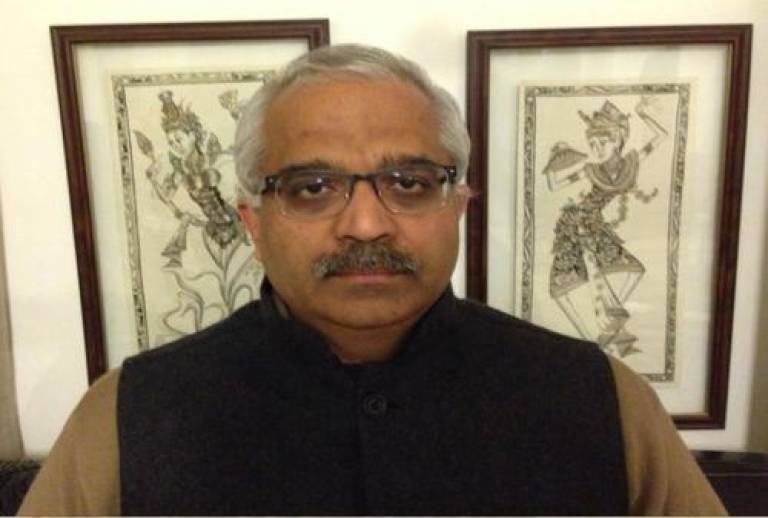A Critical Take on the Civil Society Project
8 August 2016
Robert Rix (GGI Research Assistant) on a GGI keynote lecture with Professor Aseem Prakash.

Aseem Prakash delivered a searing interrogation of the principled status of NGOs as he asked difficult questions about the ways in which resources are distributed through civil society. Driven by an interest in non-state actors, which play an increasingly influential role in global governance, Prakash turned a critical eye on a movement described by some commentators as being comparable in significance to the emergence of the nation-state, in that the emergence of civil society in its current form has fundamentally altered the relationship between citizen and state.
Prakash took us back to the fall of the Berlin Wall to provide the context for civil societies' rise to prominence. At a time when state and market-based approaches to governance had both produced significant failures, civil society seemed to provide a third way. Bottom-up, community-funded organisations, free from the influences of politics or market greed, would generate trust and social capital thanks to the guiding hands of principled actors that populated them. In those countries which did not have a functioning civil society, which was many, it could be conjured into being by generous donors, such as George Soros, who opened their cheque books and gave wing to the massive internationalisation of the NGO panorama. The NGO vector soon became the conduit for the delivery of a significant proportion of foreign aid, bypassing governments which were increasingly viewed as corrupt or dysfunctional. The international architecture also provided an accommodating institutional environment for NGO's, as organisations such as the World Bank and the IMF invited them to attend events and contribute at meetings. The establishment position was clear: NGOs are a positive good!
However, holding such a blanket assumption about a whole range of organisations that operate under the banner of civil society is problematic. For a start, the term "NGO" is a result of conceptual overstretch and covers organisations that provide a variety of different functions. Part of the justification for the prominence of civil society is the social capital it generates, yet we need to distinguish between different types of civil society organisations when assessing their impact. Large international NGOs that operate as service providers or advocacy networks, such as Oxfam or Amnesty International, are unlikely to be capable of generating the community ties we would expect from locally organised groups.
Our theories about NGOs also fail to account for the degree of contamination in the sector; the number of organisations that want to take advantage of the principled status of NGOs to make easy money. This is perhaps not surprising given the amount of resources flowing through the industry, the low barriers to entry and low employment levels in developing countries where many such NGOs operate. Some of these "contaminated" NGOs are faith-based organisations, prominent in the USA, India and Pakistan, which play on the vaulted position of religion in such societies. Other NGOs have been based on fraudulent claims of their founders who bid for funds on the basis of fictitious experiences, or have simply lied about building schools or hospitals in wherever they operate. At this point it is important to emphasise that there are many honest NGOs who do good work, but there is sufficient contamination in the sector to prompt us to question the simplistic assumption that all NGOs are inherently principled actors.
A major problem with the NGO industry is the lack of accountability, due in part to the perceived wisdom that NGOs are principled actors. In addition, the nature of their operations makes monitoring their activities in foreign countries difficult. There are no electoral processes or market signals through which to provide a challenge to poor service delivery as recipients are predominantly too poor or desperate to seek alternatives. Perhaps the biggest accountability issue stems from the resource dependence of NGOs on their donors. NGO operations inevitably tend to suit the preferences of donors rather than the needs of people such organisations are set up to help. This funding dynamic damages the underlying principle of bottom-up independence on which the legitimacy of the civil society project is based. As soon as an organisation relies upon government money, it runs the risk of being drawn into partisan politics, or being used as an outsourcing agency to do things a government doesn't want to do itself. Once this dividing line between government and civil society has been blurred, the credibility of civil society organisations as authentic representatives of the communities they are supposed to serve is severely undermined.
This is particularly problematic at the international level where the funders of NGOs are mostly powerful governments and international organisations. This has led to a situation in which most charities in developing countries are seen as peddling their donors' agendas. Increasing professionalization of the industry has altered expectations of citizens in many countries and undermined genuine grass-roots progressive movements as a 'hand-out' culture becomes the norm. As a fifth of foreign aid is now distributed through NGOs, this has created an NGO-industrial complex of global charity chains that funnel money through the system. This process is dominated by a few powerful organisations who subcontract out to smaller organisation in developed countries generally headed by western-educated English speakers. They then subcontract down to local groups, creating a process that reinforces resource inequalities between smaller NGOs and those with access to large government contracts.
So the problem is how to distinguish between good and bad NGOs, and to design policies that encourage the flourishing of a credible and independent civil society. Some measures are already in place, with voluntary best practice measures allowing organisations to signal to donors the kind of NGO they are, or websites such as charitynavigator.org which ranks charities based on factors such as how much money goes towards helping people directly as opposed to administrative overheads. Countries such as Canada have enacted laws that stop international funding of NGOs, forcing them to raise funds locally and ensuring that authentic ties to local communities are kept intact. Unfortunately, this logic has been used for cynical ends by some governments, but the dependence by NGOs on foreign funds creates a situation in which they are vulnerable to these kinds of tactics and accusations of being foreign agents.
It is possible that a recent wave of such measures signals the end of the privileged status of NGOs. This might prompt the realisation that we need to examine failures across all sectors as attempts to buy civil society 'off the shelf' have been at best unsuccessful and at worst dysfunctional. The resources that make it through the chains of organisations to assist people directly on the ground undoubtedly make a significant difference. But this comes at a genuine cost of creating perverse incentives and the crowding out of domestic civil society which might prove a better vehicle through which to achieve progressive change. We should be wary of hypocrisy when being critical of foreign funds influencing our political processes, when we are doing exactly the same when financing civil society in other countries. As a concluding remark, Prakash preaches purity, arguing that a genuine civil society can only be generated by the blood and sweat of dedicated local activists, rather than the flow of money. Only upon that basis will it be a civil society worth having.
 Close
Close


